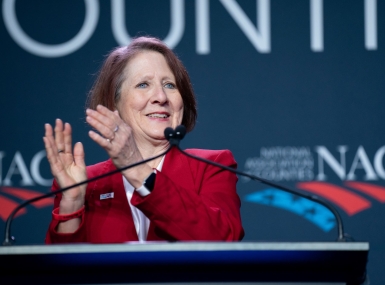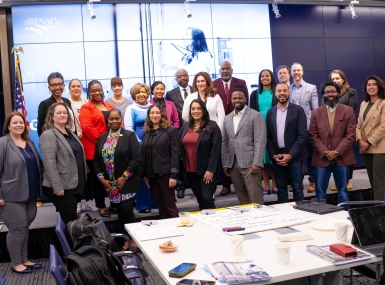Greene County, Mo. plays ... and wins ‘The Great Game of Government’

Great Game of Government has Greene County, Mo. employees act like commissioners
After experiencing layoffs and cuts to services, Greene County, Mo. became the first county government to embark on an experiment five years ago called The Great Game of Government. Its goal: to improve their cash balance and accurately forecast revenues and expenditures each month. One payoff: selection as a semifinalist in the prestigious Innovations in American Government Award program sponsored by Harvard University’s Ash Center for Democratic Governance and Innovation.
The Great Game of Government gets its name from The Great Game of Business, a book by local businessman Jack Stack, whose theories teach employees to act like owners, using open-book management techniques. Open-book means opening all financial books and records to employees and citizens to show how their actions impact the bottom line.
Stack met with the county in 2011 about adapting the game to government. Afterward, “we all looked at each other and said ‘It’ll just never work in government,’” said County Auditor Cindy Stein.
Flash forward to 2012: “We weren’t really seeing a recovery after the recession, we still weren’t getting off center,” said Stein. “So, we said, ‘What can it hurt? We’re not digging ourselves out.’” At that point, the county had a little under $4 million in cash reserves, but should have been closer to $9 million, she said, noting “we have payroll every two weeks and it’s $1 million.”
Stein and then-County Administrator Tim Smith spearheaded the launch of the game with the blessing of the county commissioners.
Sharing the numbers
Before launching The Great Game of Government, Greene County operated like a lot of other counties. Its financial offices met periodically with the County Commission to deliver financial reports and offer advice on spending.
Open-book management obligates each county office to assess its spending, make projections and evaluate its impact on the overall budget with county employees included in discussions.
Sharing budget information from all the county departments with everyone was an eye-opener, Stein said. “It’s not an easy cultural change. Most folks didn’t know the numbers for their own department. Everyone should know the numbers.”
Financial information is shared on the county’s “financial dashboard” on its website, featuring detailed monthly budget projection numbers for the county.
“We brought all the departments together and really started solving budget problems collectively,” Stein said, noting that the county encourages all employees to share cost-cutting ideas no matter how big or small.
A custodian who attended an employee meeting went back to his boss and told him that if they started measuring their cleaning liquids, it might save money, and it did, Stein said. “Lo and behold, we didn’t have to order as often. We can all relate to that.” Other employees have made suggestions for changing building plans that have saved thousands more dollars.
Previously, when the county would go over budgets, each department would make a presentation separately; now, when budgets are presented, “everyone comes in together,” Stein said, noting that handouts are made and information is shared on a big screen. This way, employees discover the “stories behind the budget requests.”
Great Game staff 'huddle'
At the center of the Great Game of Government is employee participation, which includes a weekly meeting called The Huddle, where about 50 out of 800 employees from all the county’s departments come together each Tuesday morning at 8:12 a.m. in a room at the historic courthouse.
“It’s not 8:10, it’s not 8:15, you don’t forget when it comes up on the calendar,” said Angie Crews, an accounting specialist for Greene County who helps plan the meetings. The meetings are made up of an ever-revolving number of employees, so everyone has a chance to attend, and minutes, photos and presentations are posted on the financial dashboard on the Web site. At the first meeting, a coach from the Great Game of Business came to facilitate to kick it off.
Depending on the week, the meetings feature:
- “Commissioner Corner,” where employees hold a Q&A with a commissioner (or all three). “It’s open game,” said Crews, “they ask questions about whatever’s going on around the county.”
- “Character First.” With information provided by Strata Leadership LLC, important workplace behaviors are discussed, such as “alertness and being aware of things around you,” Crews said.
- Motivational ideas are presented that employees have discovered from attending “Gathering of the Games,” an annual conference where businesses and other groups like non-profits that are playing The Great Game of Business share best practices.
- Learning about different departments “so employees get the whole picture,” not only about what other employees do, but how what they do impacts the public and budget decisions. “We recently had the sheriff’s office come in and talk about their Civil Department, which had recently moved into the courthouse,” Crews said. Other employees are encouraged to ask questions. “We try to teach employees to not question the people, but question the process, the numbers.”
- Representatives from the Chamber of Commerce, United Way or Big Brothers, Big Sisters, often come to speak at the meetings.
- On the fourth Tuesday of the month, employees share spending projections for their departments. Employees who come closest to projections receive awards, Stein said. As the game has progressed, some come as close to half of 1 percentage point when predicting spending or revenue.
- When there is a fifth Tuesday of the month, County Treasurer Justin Hill emcees county-themed game shows based on “Jeopardy!” or “Who Wants to Be a Millionaire?” where employees guess the answers to questions based on information from previous meetings. “He makes it fun,” said Crews.
How are we doing?
Here’s a look at how Greene County’s general cash balance has changed over recent years; the county began playing “The Great Game of Government” in 2012 and in earnest at the beginning of 2013, Stein said.
- 2008: $2.17 million
- 2009: $4.35 million
- $2010: $3.49 million
- 2011: $3.86 million
- 2012: $4.4 million
- 2013: $6.47 million
- 2014: $9.9 million
- 2015: $11.96 million
Historically, departments had taken the attitude that if their budget wasn’t spent, they would lose those funds in the next year, Stein said. “We now have a system to reward the savings that departments bring to the county. Departments no longer project their full budgets as they continue to encourage employees to conserve resource and share innovative ideas.”
By 2015, the county was able to bring their cash reserves up to nearly $12 million, which allowed it to give employees their first cost-of-living raise in nearly six years and fund several maintenance projects which had been delayed due to budget constraints.
The Missouri Association of Counties recognized Greene County for its financial transparency through open-book management with its 2016 Achievement Award.
Attachments
Related News

Podcast: ForwardTogether during National County Government Month
NACo President Mary Jo McGuire spoke to the County News Podcast about National County Government Month seen through the prism of her presidential theme: ForwardTogether — connect, inspire and lead.

Equity task force shares preliminary ideas for report
NACo's Equity + Governance Task Force is working to identify, prioritize and develop tools and resources counties need to advance equity in our communities.

Citizens help parish hire administrator
Jefferson Davis Parish, La. looked to its civically-engaged residents to help take politics out of hiring an administrator.
